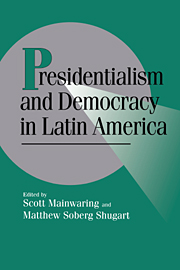Book contents
- Frontmatter
- Contents
- Contributors
- Acknowledgments
- Introduction
- 1 Presidentialism and Democracy in Latin America: Rethinking the Terms of the Debate
- 2 Multipartism, Robust Federalism, and Presidentialism in Brazil
- 3 The Unrealized Potential of Presidential Dominance in Colombia
- 4 Presidential Behavior in a System with Strong Parties: Venezuela, 1958–1995
- 5 Strong Candidates for a Limited Office: Presidentialism and Political Parties in Costa Rica
- 6 Political Sources of Presidencialismo in Mexico
- 7 Evaluating Argentina's Presidential Democracy: 1983–1995
- 8 In Defense of Presidentialism: The Case of Chile, 1932–1970
- 9 Executive–Legislative Relations in Post–Pinochet Chile: A Preliminary Assessment
- 10 Hybrid Presidentialism and Democratization: The Case of Bolivia
- 11 Conclusion: Presidentialism and the Party System
- Appendix: Outlines of Constitutional Powers in Latin America
- References
- Index
11 - Conclusion: Presidentialism and the Party System
Published online by Cambridge University Press: 05 June 2012
- Frontmatter
- Contents
- Contributors
- Acknowledgments
- Introduction
- 1 Presidentialism and Democracy in Latin America: Rethinking the Terms of the Debate
- 2 Multipartism, Robust Federalism, and Presidentialism in Brazil
- 3 The Unrealized Potential of Presidential Dominance in Colombia
- 4 Presidential Behavior in a System with Strong Parties: Venezuela, 1958–1995
- 5 Strong Candidates for a Limited Office: Presidentialism and Political Parties in Costa Rica
- 6 Political Sources of Presidencialismo in Mexico
- 7 Evaluating Argentina's Presidential Democracy: 1983–1995
- 8 In Defense of Presidentialism: The Case of Chile, 1932–1970
- 9 Executive–Legislative Relations in Post–Pinochet Chile: A Preliminary Assessment
- 10 Hybrid Presidentialism and Democratization: The Case of Bolivia
- 11 Conclusion: Presidentialism and the Party System
- Appendix: Outlines of Constitutional Powers in Latin America
- References
- Index
Summary
One of the fundamental arguments of this book has been that presidentialism has significant variations. Although this statement sounds intuitively sensible, little careful work has been done to conceptualize how presidentialism varies. In conjunction with Chapter 1, in this Conclusion we attempt to advance the efforts to develop such a conceptual map, oriented especially toward the Latin American cases. Here we analyze the party system characteristics on which Latin American countries vary and discuss how these features interact with the variations in legislative powers discussed in Chapter 1.
We argue that the nature of the party system, in particular the number of parties, makes a fundamental difference in how presidential systems function. The number of parties affects the likelihood of at least general compatibility between the assembly and the president. With a highly fragmented multiparty system, no party controls close to a majority. This situation can be problematic because the president typically has difficulties building reliable governing coalitions. The logical opposite situation, in which the president's party consistently has a majority, is not necessary or even desirable, but presidentialism usually works better if the president's party is a major party with a sizable legislative contingent. On this dimension there are marked contrasts among Latin American presidential systems. In some countries, presidents' parties consistently have at least 40% of the seats in congress, whereas in others they usually hold a small minority of seats.
Presidentialism is also affected by how disciplined the political parties are. Disciplined parties afford a level of predictability and facilitate executive–legislative relations.
- Type
- Chapter
- Information
- Presidentialism and Democracy in Latin America , pp. 394 - 439Publisher: Cambridge University PressPrint publication year: 1997
- 66
- Cited by



